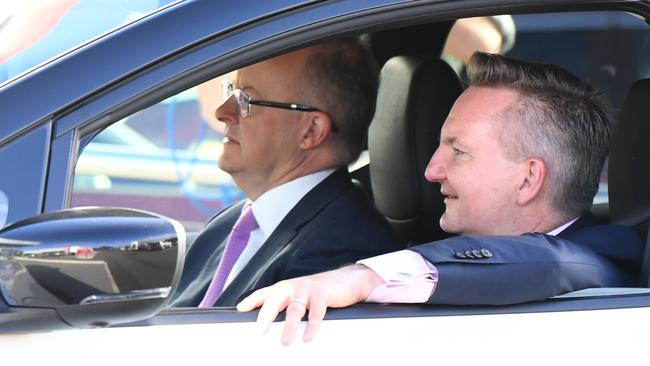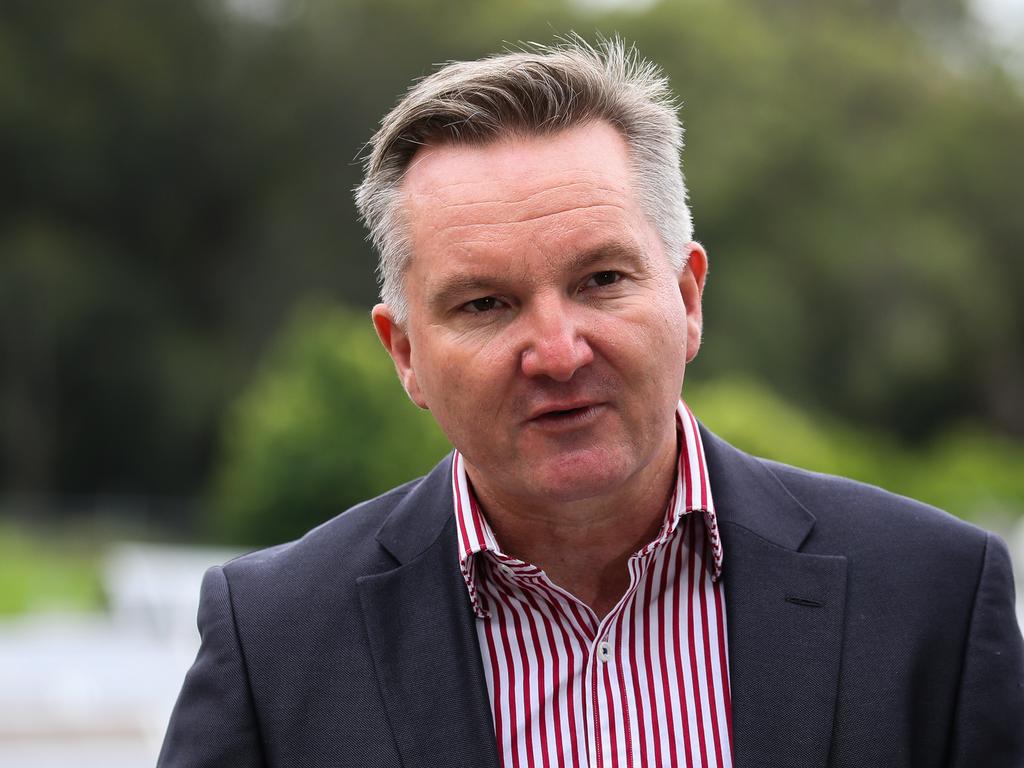
The Morrison government must beware being locked into the mindsets from the 2019 and even the 2013 elections on climate politics when the caravan has moved on. The policy brought down by Anthony Albanese and Chris Bowen has two purposes – to show Labor is more ambitious on climate policy than the Morrison government and to buttress Labor against the Coalition attacks that destroyed it in 2013 and 2019.
Albanese and Bowen still carry the scars from Labor’s past blunders. These are seared into their consciousness after the destruction of the Gillard government. This issue is about climate but also goes to Labor’s existence as a majority party of government. “We must govern alone or not at all,” Bowen said after the 2013 defeat. “People need to be very clear in their understanding. If you vote Labor you will not get Greens policies by default.”
Julia Gillard’s formal alliance with the Greens was her political death warrant and led to the carbon pricing deal, a Labor-Greens policy. When Gillard announced the policy on February 24, 2011, she was no longer in command but had become a Labor prime minister sharing power with the Greens. When Albanese became deputy prime minister to Kevin Rudd in June 2013 he repudiated any further arrangements with the Greens.
There are two certainties about any Albanese government, majority or minority: there will be no alliance with the Greens and no policy compacts with the Greens over climate change targets. Bowen delivered an unqualified “no” when asked on Monday whether Labor would negotiate with the Greens to increase its target. Why should we believe him? Because such a blunder would compromise a new ALP government and because it doesn’t need to negotiate. If Labor forms a minority government the Greens cannot support the Coalition as an alternative; if the Greens threaten Labor’s legislation that will not purchase them any influence.
Bowen told the ABC if the Coalition and Greens united to defeat the 43 per cent target of a Labor government then Labor would proceed anyway without legislation. Bowen’s message – the parliament can vote it up or down.
But this is the figure Labor will put before the world. It will be attacked, of course, by the climate change lobby and progressive media given the global pressure for a 50 per cent medium-term target with the Greens demanding a ludicrous 75 per cent.
Scott Morrison said on Monday the election was a choice between Liberals and Nationals on one hand and Labor and the Greens on the other. If this is the voting perception, then Morrison wins. The task of Albanese, Bowen and senior ALP figures is to spell out that Labor will govern in its own right, that the contest is Coalition v Labor. Yet this becomes part of a far bigger historical question – given the decline in the ALP primary vote over 20 years, how viable is Labor’s future as a majority governing party?
The climate issue has produced another historic realignment. Business and industry is going with Labor and against Morrison. This is a rare event with few parallels at a national election during the past half century. It reveals a stark truth – while Morrison was right to drive the Coalition, kicking and screaming, to accept net zero at 2050, the national centre of political gravity has moved even further.
The Coalition may hope that just as Bowen went too far on tax in 2019 that he has gone too far on climate in 2021. But that is unlikely. Labor’s 43 per cent medium-term target is below the three state Liberal governments, with NSW and South Australia on 50 per cent and Tasmania on 100 per cent (net zero by 2030).
“If Labor’s 43 per cent is unsafe what does the Prime Minister think of the NSW government’s 50 per cent by 2030?” Bowen asked. “When the Prime Minister talks about driving out jobs in Bell Bay and the Hunter, is that directed at Peter Gutwein and Dom Perrottet?”
Labor’s target is below the recent policy unveiled by the Business Council of Australia, representing major companies, of a 46-50 per cent medium-term target. Labor has stacks of political cover. “It is a modest policy,” Albanese said. “We do not pretend it is a radical policy.” Equally startling is that Labor took its policy design from the BCA.
Labor is using the Coalition’s own safeguard mechanism and, following the BCA report, emission baselines will be reduced to achieve the targets, in effect forcing entities to fasten their rate of emission reductions. There are 215 big-emitting facilities covered by the existing mechanism and, as Bowen says, two-thirds are already pledged to net zero by 2050.
BCA chief executive Jennifer Westacott welcomed Labor’s “more ambitious short-term target”, saying it “makes sense” by getting the heavy lifting “done earlier”. She said targets weren’t solely enough, so it was “great to see Labor setting out a plan to get there”. In short, while Labor is more modest than the BCA, they have the same strategy.
This would have been inconceivable two years ago. Remember that Bill Shorten assailed business for years, attacked the greed of the “big end of town”, preached a relentless diatribe of class warfare and ran on an anti-business, big tax redistribution agenda. Albanese, by contrast, has aligned on climate with the main business groups, the BCA and the Australian Industry Group. Bowen asks: how does Morrison claim to know more about the impact of Labor’s policies on Australian companies than those companies themselves?
While Shorten’s 45 per cent emissions reduction target was just higher than Albanese’s 43 per cent, the differences are substantial. Albanese and Bowen have put a detailed plan, policy, modelling and costs on the table, unlike Shorten. These costs and modelling are almost certainly too good to be true. The market will drive faster fossil fuel job losses. There will be a price to pay for Labor’s ambition but also opportunities from that ambition. Expect furious disputes over Labor’s modelling in coming weeks and months.
Finally, the government’s claims of a carbon tax constitute a shonky half truth at best. Gillard had a real carbon tax starting with a fixed carbon price of $23 a tonne, raising huge revenues then diverted to support business, households and clean energy.
Labor’s plan will involve tradeable credits for companies staying below their baseline, creating a market-based carbon price, boosting investment in low-emissions technology but not raising any revenue for government.
Morrison’s climate campaign will get traction in some seats. But he needs to be careful – the more he attacks Labor policies in the regions the more his MPs in leafy capital city seats will feel vulnerable – it’s the seesaw effect. Morrison cannot win the election on a climate scare campaign. The sooner the government grasps this the better.
Labor has put together targets and policies that are mainstream, bold but not radical. The politics of climate in 2022 are going to be different from 2013 or 2019.







The politics of climate change are filled with traps – consider the historic reversal on display with Labor’s new medium-term 43 per cent emission reduction policy being backed by business, industry and most economists who favour a market-based approach.